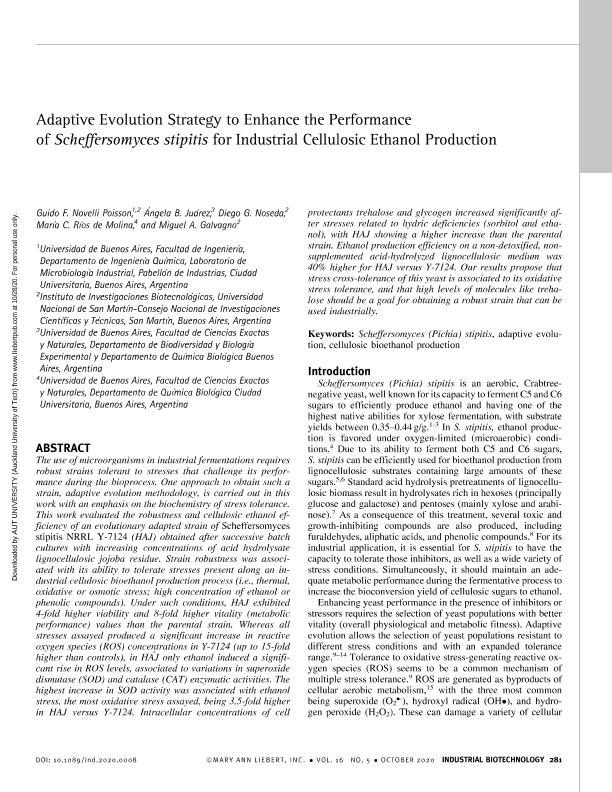Artículo
Adaptive evolution strategy to enhance the performance of scheffersomyces stipitis for industrial cellulosic ethanol production
Novelli Poisson, Guido Fernando; Juárez, Angela Beatriz; Noseda, Diego Gabriel ; Ríos de Molina, M.C.; Galvagno, Miguel Angel
; Ríos de Molina, M.C.; Galvagno, Miguel Angel
 ; Ríos de Molina, M.C.; Galvagno, Miguel Angel
; Ríos de Molina, M.C.; Galvagno, Miguel Angel
Fecha de publicación:
10/2020
Editorial:
Mary Ann Liebert
Revista:
Industrial Biotechnology
ISSN:
1550-9087
e-ISSN:
1931-8421
Idioma:
Inglés
Tipo de recurso:
Artículo publicado
Clasificación temática:
Resumen
The use of microorganisms in industrial fermentations requires robust strains tolerant to stresses that challenge its performance during the bioprocess. One approach to obtain such a strain, adaptive evolution methodology, is carried out in this work with an emphasis on the biochemistry of stress tolerance. This work evaluated the robustness and cellulosic ethanol efficiency of an evolutionary adapted strain of Scheffersomyces stipitis NRRL Y-7124 (HAJ) obtained after successive batch cultures with increasing concentrations of acid hydrolysate lignocellulosic jojoba residue. Strain robustness was associated with its ability to tolerate stresses present along an industrial cellulosic bioethanol production process (i.e., thermal, oxidative or osmotic stress; high concentration of ethanol or phenolic compounds). Under such conditions, HAJ exhibited 4-fold higher viability and 8-fold higher vitality (metabolic performance) values than the parental strain. Whereas all stresses assayed produced a significant increase in reactive oxygen species (ROS) concentrations in Y-7124 (up to 15-fold higher than controls), in HÁJ only ethanol induced a significant rise in ROS levels, associated to variations in superoxide dismutase (SOD) and catalase (CAT) enzymatic activities. The highest increase in SOD activity was associated with ethanol stress, the most oxidative stress assayed, being 3.5-fold higher in HAJ versus Y-7124. Intracellular concentrations of cell protectants trehalose and glycogen increased significantly after stresses related to hydric deficiencies (sorbitol and ethanol), with HAJ showing a higher increase than the parental strain. Ethanol production efficiency on a non-detoxified, nonsupplemented acid-hydrolyzed lignocellulosic medium was 40% higher for HAJ versus Y-7124. Our results propose that stress cross-tolerance of this yeast is associated to its oxidative stress tolerance, and that high levels of molecules like trehalose should be a goal for obtaining a robust strain that can be used industrially.
Archivos asociados
Licencia
Identificadores
Colecciones
Articulos (IIBIO)
Articulos de INSTITUTO DE INVESTIGACIONES BIOTECNOLOGICAS
Articulos de INSTITUTO DE INVESTIGACIONES BIOTECNOLOGICAS
Citación
Novelli Poisson, Guido Fernando; Juárez, Angela Beatriz; Noseda, Diego Gabriel; Ríos de Molina, M.C.; Galvagno, Miguel Angel; Adaptive evolution strategy to enhance the performance of scheffersomyces stipitis for industrial cellulosic ethanol production; Mary Ann Liebert; Industrial Biotechnology; 16; 5; 10-2020; 281-289
Compartir
Altmétricas



